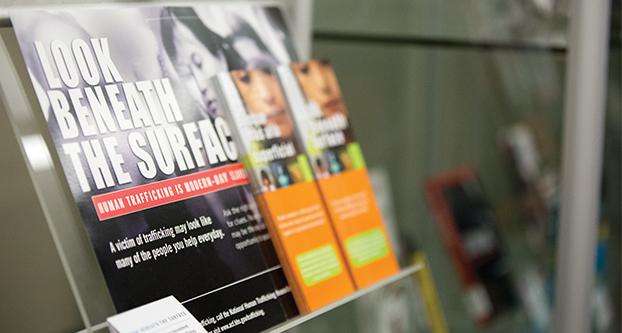“Human trafficking is modern day slavery.”
These words are displayed with a new human trafficking display in the Henry Madden Library.
Raymond Pun, the Library Diversity Committee’s co-chair, said the exhibit was there to bring awareness on campus.
“Fresno is actually [a city that] has had some incidents in human trafficking,” said Pun, “It’s hard because we live here and you think you know what it looks like, but you actually don’t know who’s being trafficked. It’s really, really difficult. It could be any normal person.”
The display includes resources such as pamphlets, posters and stickers with the phone number for the National Human Trafficking Resource Center. There is also a glass case with congressional hearings, DVDs and various books inside. The books are about different types of human trafficking, including the trafficking of women and children. The congressional hearings relate to human trafficking and include information such as testimonies, transcripts, graphs and evidence of human trafficking.
Olivia Estrada, who works in information technology who is also a member of the committee, chose the books that are in the display. She encourages students to find the books in the library.
One of the books in the display is “Guilty Without Trial: Women in the Sex Trade in Calcutta” by Carolyn Sleightholme and Indrani Sinha. It details the experiences of sex workers in Calcutta, India and includes interviews and case studies. Another book in the display is “Rethinking Trafficking in Women: Politics Out of Security” by Claudia Aradau, which discusses possible measures that could be taken against human trafficking.
“We want to show students the wealth of information that we do have on the topic,” said Rebecca Reid—Johansson, a member of the committee who works in maps and government information.
“Other people might not think human trafficking is, like, here in the U.S., you know?” said Fresno State student Michelle Ounkham. “And it could be [happening to] people around us.”
One of the posters that is part of the display states, “A victim of trafficking may look like many of the patients you see daily.”
“Our work as the diversity committee is to promote diversity awareness, sensitivity and supporting the community through these efforts,” Pun said.
The display is on the second floor of the Henry Madden Library.




